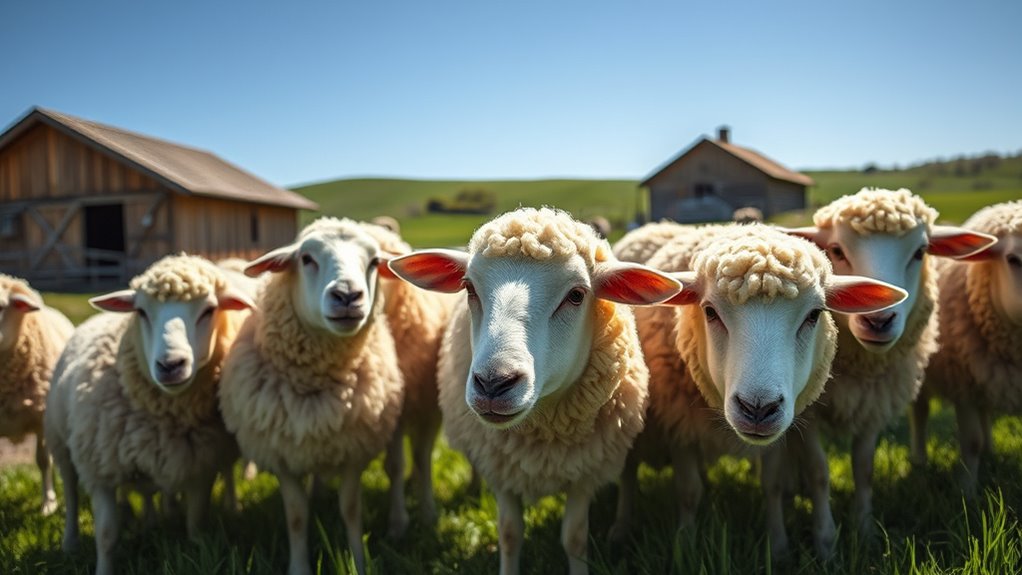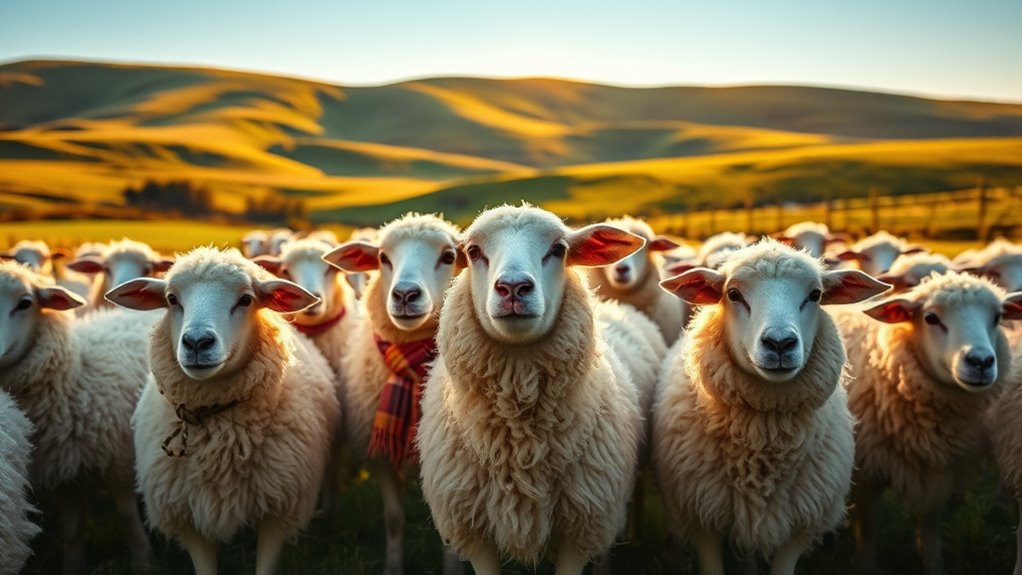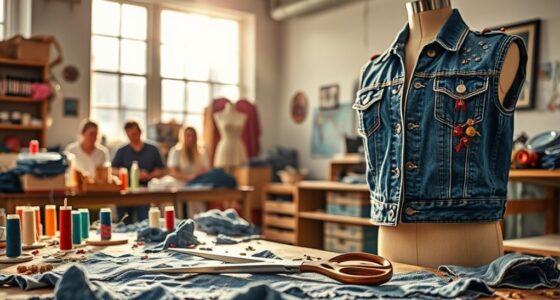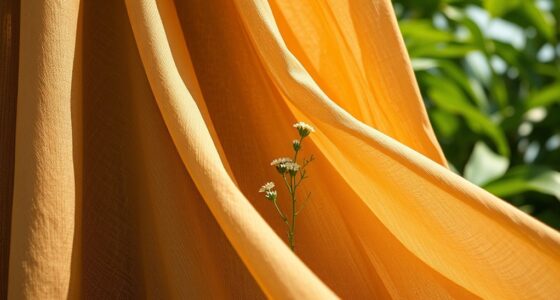Yes, ethical wool shows that sheep can be both chic and happy. When farmers prioritize animal welfare, they provide humane handling, good shelter, and sustainable practices that keep sheep stress-free and healthy. This leads to softer, stronger wool, making your fashion choices more eco-conscious and cruelty-free. By supporting brands that focus on ethical wool, you help promote happier sheep and better environmental practices. If you want to discover more about this stylish, compassionate trend, keep exploring.
Key Takeaways
- Ethical wool practices ensure sheep are treated humanely, promoting their happiness and well-being.
- Well-cared-for sheep produce higher-quality, softer wool, blending comfort with style.
- Sustainable farming avoids stressors like overgrazing, creating healthier environments for sheep and ecosystems.
- Ethical sourcing encourages brands to prioritize animal welfare, making fashionable wool both chic and compassionate.
- Choosing ethically produced wool supports happy, healthy sheep while contributing to eco-friendly, stylish fashion.

Have you ever wondered where your wool comes from and whether it’s produced ethically? When you choose wool, it’s essential to consider the origins of the fiber and how the sheep behind it are treated. Ethical wool production focuses on animal welfare and sustainable farming practices, ensuring that sheep are not just commodities but living beings with needs and rights. Many farms now prioritize humane treatment, providing proper shelter, adequate nutrition, and gentle handling. These practices prevent unnecessary stress or injury, creating a healthier environment for the animals and better quality wool for consumers like you.
Choosing ethically sourced wool supports animal welfare and sustainable farming practices for better quality and a kinder planet.
Sustainable farming plays a vital role in ethical wool production. Instead of overgrazing or exploiting land, responsible farms rotate pastures and maintain eco-friendly practices that support the environment. This approach reduces soil erosion, conserves water, and promotes biodiversity. By choosing wool from farms committed to sustainable farming, you’re supporting a system that balances the needs of the animals, the land, and future generations. Such farms often avoid harmful chemicals or synthetic additives, opting instead for natural treatments that are safe for both sheep and the environment.
When you buy ethically produced wool, you’re making a statement about your values. You’re supporting farmers who prioritize animal welfare, ensuring their sheep are raised with respect and compassion. These farmers often participate in certifications or transparency programs that verify humane treatment and sustainable practices. Knowing that your wool comes from such sources can give you peace of mind, knowing your fashion choices align with your ethics.
Furthermore, sustainable farming can lead to higher-quality wool. When sheep are well-cared for and raised in natural, stress-free environments, the wool they produce tends to be softer, stronger, and more durable. This means your clothing and accessories won’t just look good but will last longer, reducing the need for frequent replacements and further minimizing environmental impact.
Choosing ethical wool also encourages widespread change in the industry. Your demand for cruelty-free, sustainable products pushes other brands and farmers to adopt better practices. It creates a ripple effect, inspiring more sustainable farming methods and heightened awareness about animal welfare. Additionally, color fidelity is often better in wool produced ethically, as sheep raised in stress-free environments tend to produce more vibrant and consistent fibers. Ultimately, by being conscious of where your wool comes from, you contribute to a more compassionate and environmentally responsible fashion industry, proving that you can be chic and considerate at the same time.
Frequently Asked Questions
How Does Ethical Wool Impact the Price of Clothing?
When you consider how ethical wool impacts clothing prices, you’ll see that supply chain transparency plays a big role. Ethical wool often costs more because it involves fairer treatment of sheep and sustainable practices, which can elevate production costs. While this might make the clothes slightly more expensive, it can also guarantee consumer affordability in the long run by promoting fair trade and reducing environmental impact.
Are There Certifications to Verify Ethical Wool Practices?
Think of certification standards as a map guiding you through a complex forest of supply chain transparency. Yes, there are certifications like GOTS, Responsible Wool Standard, and ZQ that verify ethical wool practices. These labels guarantee farmers treat sheep well and follow sustainable methods. When you see these certifications, you can confidently choose wool products that align with your values, trusting they meet strict ethical standards.
Can Ethical Wool Be as Durable as Conventional Wool?
You wonder if ethical wool can match the durability of conventional wool. The good news is, ethical wool, as a sustainable fiber, is designed to be just as resilient. Farmers who prioritize animal welfare often use high-quality breeds and proper care, ensuring the wool’s strength. When you choose ethical wool, you’re supporting durability and sustainability, proving that caring for animals and creating long-lasting products can go hand in hand.
What Are the Environmental Benefits of Ethical Wool?
You’ll find that ethical wool offers significant environmental benefits, especially through sustainable farming practices that prioritize animal welfare and land health. By choosing ethical wool, you reduce your carbon footprint because these farms often use eco-friendly methods, minimize chemical use, and promote biodiversity. This sustainable approach helps conserve resources and combat climate change, making it a more environmentally responsible choice compared to conventional wool.
How Can Consumers Identify Truly Ethical Wool Products?
To identify truly ethical wool products, you should look for certifications that emphasize sheep welfare and sustainable sourcing, such as the Responsible Wool Standard or GOTS. Read labels carefully, and research brands’ commitments to eco-friendly practices. By choosing products with transparent supply chains, you guarantee that the wool you buy supports ethical treatment of sheep and sustainable farming methods, making your purchase both stylish and conscientious.
Conclusion
So, next time you choose wool, remember—you hold the power to make a difference. By opting for ethical sources, you’re not just buying fabric; you’re weaving a future where sheep are truly cared for. Isn’t it time we ask ourselves: should fashion come at the cost of comfort? Let your choices be the thread that stitches compassion into every wardrobe decision—because, in the end, kindness is always in style.









